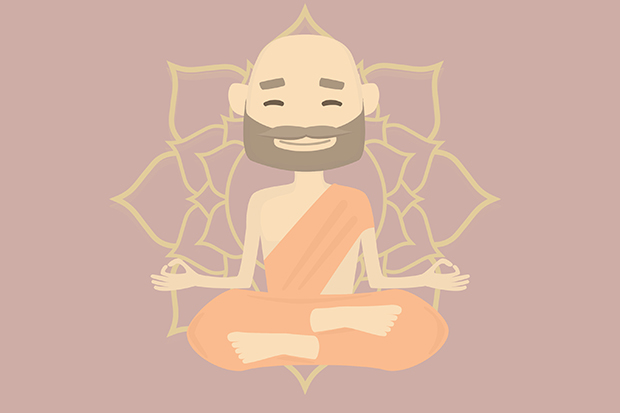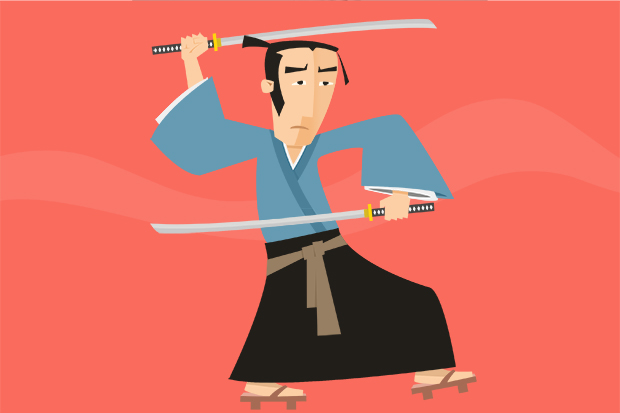on

Bodhidharma, credited by the Chinese as having founded the Chan School of Buddhism—known as Zen in Japan and the West—famously captured the essence of the school in the lapidary phrase ‘Direct pointing to the human mind’. It is the first of a two-phrase saying, the second of which is the phrase ‘Perceiving one’s true nature and attaining Buddhahood’. Bodhidharma did not leave many written teachings, but the legends surrounding him hold a special place in Zen canon and speak of truths that cannot be captured by mere words alone.
Among these is Bodhidharma’s famous encounter with Emperor Wu of Liang. Emperor Wu, a devout Buddhist himself, had requested an audience with Bodhidharma. The exchange between them went like this:
Emperor Wu: ‘I have built many temples, ordained monks, had sutras copied, and commissioned Buddha images. How much merit have I earned?’
Bodhidharma: ‘None. Good deeds result in good karma, but there is no merit.’
Emperor Wu: ‘What is the highest meaning of the holy truths?’
Bodhidharma: ‘Empty, not holy.’
Emperor Wu: ‘Then who is this facing me?’
Bodhidharma: ‘I know not.’
After this, Bodhidharma, the legends say, crossed the Yangtze River into Wei and sat facing a wall for nine years.
Let us now try to understand this business of ‘direct pointing to the human mind’. Do you have a mind? Is it really yours? If your answer is yes, you would stay stuck in Saṃsāra, the cycle of death and rebirth, unable to break free. If you answer no, you share in the freedom that Bodhidharma preached.
Chan, or Zen, in many ways predates Bodhidharma. The following incident is considered by the Buddhists to be the beginning of Zen. It is said that one day, Buddha, instead of conducting his usual sermons, held up a flower. His audience was puzzled except for Maha Kashyapa, who smiled. Buddha then said, ‘I have the eye of the true teaching, the heart of Nirvana, the formless form, the mysterious gate of Dharma beyond the words and beyond all teachings. I now transmit this to Maha Kashyapa.’
A flower is born of a plant; it does not arise by itself. The plant arises from a seed or another plant. This is similar to how things in your mind arise. Each of the objects in your mind arise from other objects and conditions. If you follow that chain of causes all the way back, you eventually arrive at the mind ground. This mind ground is devoid of any selfhood. It responds freely to conditions. These conditions are born of the mind ground itself. What you claim to be you is, in actuality, the result of this mind ground. But this is not your mind ground. To see this directly is to be freed of existence. To be a Buddha is to be free of the mind. It means to realize that there is no mind that you can lay claim to. You are freed at once of all the delusions, attachment, greed, anger, and fear that you have always claimed to be yours and essentially understood as representing you.
You will find constant reminders of your intrinsic nature everywhere in the natural world. Every blade of grass preaches Buddhadharma. Ask yourself: Does the grass arise on its own?
In his encounter with Emperor Wu, Bodhidharma responded to his questions with the doctrine of emptiness. This doctrine represents the idea that all things are empty of inherent existence and nature. To say that something is ‘empty’ is to say that it is ‘dependently originated’. When Bodhidharma says, ‘There is no merit’, he points to the absence of a self to whom merit will accrue. This is the same truth expressed in the story about the flower raised by Buddha. What if Maha Kashyapa did not smile? What if everybody in the assembly smiled? Would the transmission have happened? The understanding that arose in Maha Kashyapa—was it indeed his? It arose in response to circumstances. Maha Kashyapa clearly did not understand, which is how he understood. He did not claim that understanding as his or as part of him. To see that all that arises is the result of causes and that no one has claim over it is to see into the nature of things. When he replied, ‘I know not’, to Emperor Wu’s question as to who he was, Bodhidharma was pointing to the fact that there was nothing that could be identified as him other than the causes and its results. And ‘I know not’ is the proper answer. It means that one realizes that one’s contribution to what one was in the past, what one is in the present, and what one will be in the future rests on the causes that bring it about and thus are beyond one’s knowledge. It points at the shifting nature of the structure one sees as oneself.
Let us now look at this doctrine of emptiness in some detail. Assume you are angry. Your anger could be directed at something or someone, but it did not arise unbidden. You do not wake up each day and decide that you will get angry according to some schedule you created. The anger is the result of specific causes. This anger leaves you feeling that there is a you who is angry. However, this feeling of a self who is angry did not exist before the anger arose. If you look at the self, you realise that this self exists not of itself but is the result of feelings or emotions that causes us to posit the identity of a being. This notion that these emotions must belong to someone—in this case, you—as opposed to being rooted in causes is a convention that we have created to explain things.
Think of the self like you would mathematical entities and numbers. Does the number zero exist? Yes, it does, but it depends on the context; the numbers do not have a tangible existence. Does Harry Potter exist? Yes, in the Harry Potter series of books and the movies they spawned. Does Harry Potter exist in the real world, however? No, he does not. Now, to get back to the self, does your anger exist? Yes, it does have an existence in your mind. But once it vanishes, the self that arose in that context, too, vanishes. So, does the self exist? Is there anything underneath that word or label? Is there anything outside the utility that word provides in explaining and highlighting our relationship to objects and other people? The self is of the same substance as a dream or a thought. The self, the anger, and the context which gave rise to the anger are all objects in our consciousness. They exist while their causes exist, and they cease to be once the causes that brought them about cease. But consciousness itself remains unaltered by the objects in them. This native purity of consciousness on which rests the ontological underpinnings of existence is what Buddhism seeks to call attention to.
Let me illustrate with another Zen fable:
A monk told Joshu, ‘I have just entered the monastery. Please teach me.’
Joshu asked, ‘Have you eaten your rice porridge?’
The monk replied, ‘I have eaten.’
Joshu said, ‘Then you had better wash your bowl.’
At that moment, the monk was enlightened.
Mumon, commenting on this case, said, ‘Joshu is the man who opens his mouth and shows his heart.’ Eating the porridge, the monk was left with a bowl that needed washing. Joshu here was pointing at the mind, pointing to that which responds to causes. In the absence of causes, this mind would have no reasons to seek expression. Without the porridge, there is no eating, and without eating there is no washing of bowls. There is a mind that eats and there is a mind that washes bowls. This mind is the basis for a feeling of a self or a being. Do you see the countless conditions that bring about your mind? In the absence of these, where, then, is this mind? You have for long thought that you had a mind. In the absence of conditions, where is it? Is it, then, yours, or does it function according to the causes you have little control over? You either see this and burn through your karma, or you do not and continue to stay trapped in the cycle of life and death.
What was Bodhidharma trying to teach us? What would facing a wall accomplish for anyone? What does it do to your consciousness? In the normal course of life, your consciousness is consumed by thoughts and is appropriated by the larger world. Your interaction with the world is facilitated by the exchange of consciousness, and this exchange is what you and others come to identify as your ‘self’. What happens when you withhold that consciousness? The world and the self that you have created would cease, and with it, all the complex relationships that have been built upon the self and the world would evaporate. Without the world, the mind does not stir. Without the mind moving, the world does not arise. When you look at the world, what is it that confronts you directly? If it is the world, you will not escape the mind. If instead what you see is the mind, there is hope for you.




